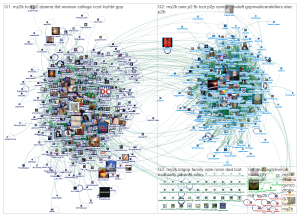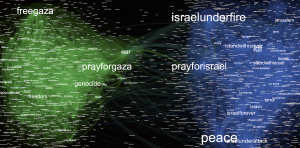The recent UK general election result came as a particular surprise to Labour’s twitter supporters. It was the most talked about party on the social network, reflecting the site’s demographic but also showing up something that commentators have long pointed out. Rather than being a marketplace of ideas where people are exposed to the huge variety of views that are expressed on the site, twitter is the ultimate echo-chamber. The two images below display the extent to which this is true in the case of American and Middle-Eastern politics respectively:
In each case, the communities of individuals speaking from a particular political perspective barely overlapped, a reflection of the fact that the social feeds that people curate reflect the news and views they want to hear and/or agree with. Digital curation, the selection, preservation, maintenance, collection and archiving of digital assets (according to wikipedia) is a form of identity presentation. The assembly of posts, pictures, connections and opinions online enable the construction, exploration and negotiation of an online identity.
What fascinates me about this is the impact that it has on broader social discourse. On its own, the idea of the online self as a curated entity brought about by the assembly of different modes of online content doesn’t produce much of an issue for me. If anything it reflects the ability of users to play with and continually form and re-form their identity online and build a much more comprehensive picture of themselves than some of the more linear offline interactions they have might allow them to do so (interesting examples of this are people who tweet about hobbies alongside their industry voices e.g. keen runners or musicians working in business or creative industries).
Much of what I have read about digital curation discusses the author or producer of content as curator (because authoring or assimilating content is an act of curation), but in the case of certain social media platforms this isn’t the case. Not all platforms place the user as the sole curator, but rather they are also guided by the actions of others in that community. Examples of this are the ‘trending’ pages on sites like instagram or youtube. More insidious perhaps is the Facebook news feed, which rewards your engagement with certain posts by showing you more of the same (which creates fascinating political bubbles, meaning labour supporters report seeing virtually no posts from friends voting for other political parties and vice versa) or more of posts that others in your network like.
The way that people curate their identities through their online behaviour enables users to explore and establish an image of themselves in community. The creation of texts that help build a sense of self which engagement with others in certain spheres can affirm and develop that. The challenge it presents is to the nature and quality of wider social discourse, which has the potential to suffer as a result of the silo-like communities that are created online, and where these online communities become increasingly dissonant from offline discourse.

